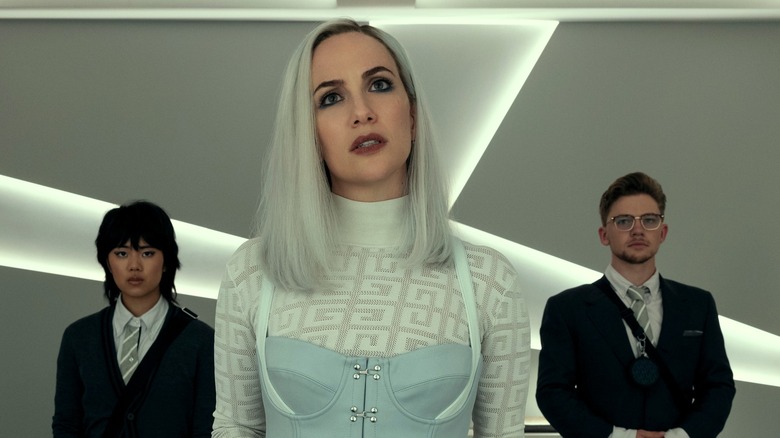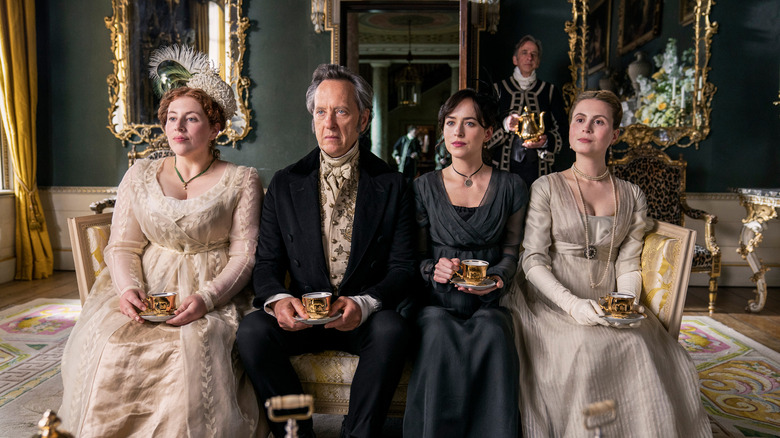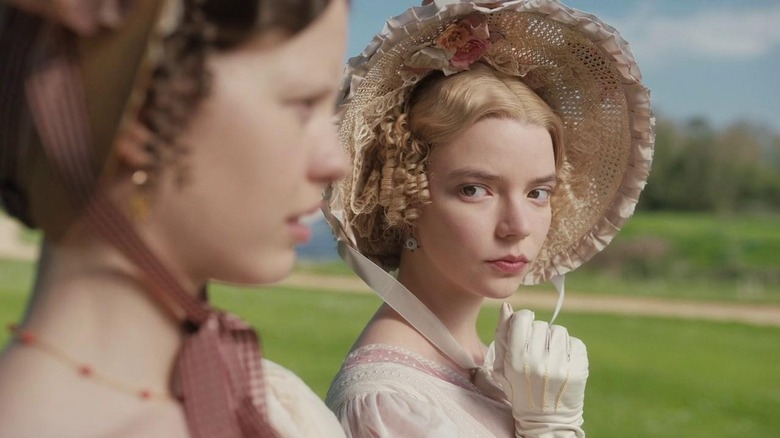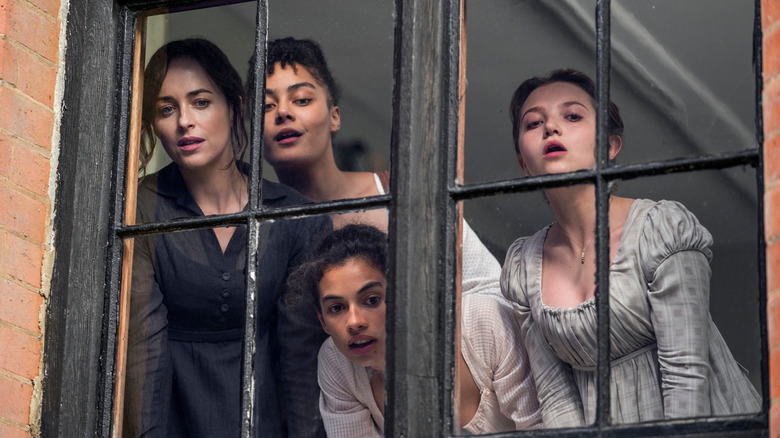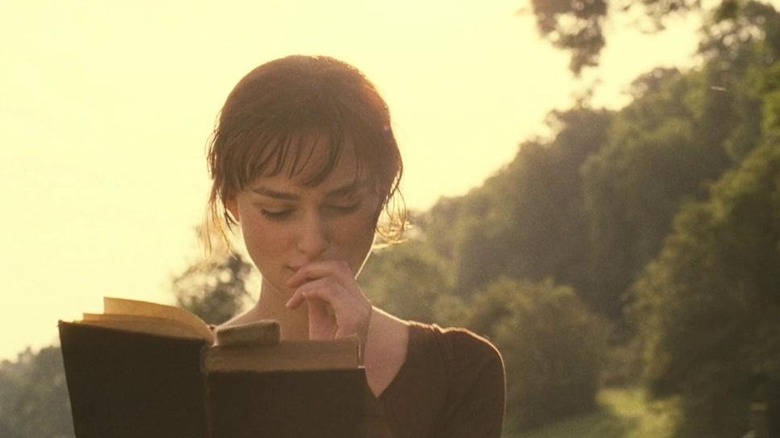Mike Flanagan's House Of Usher Proved How To Craft A Jane Austen Universe Series
For years, Mike Flanagan has been leading the charge for horror novel adaptations. It's never easy turning a book — especially one written decades in the past — into a modern movie or prestige streaming series, but Flanagan has done it again and again with the likes of Stephen King's "Doctor Sleep," Shirley Jackson, and even Henry James. But in his latest attempt at horror adaptation, "The Fall of the House of Usher," Flanagan has taken on a far more ambitious project — adapting Edgar Allan Poe's entire body of work while simultaneously moving it forward 200 years into the present.
It's a bold project, to say the least. And yet, Flanagan makes it work cohesively. "The Tell-Tale Heart" becomes a commentary on modern medical trial methods, fused with Poe's "The Murders in the Rue Morgue" for a powerful statement on the ongoing process of animal experimentation. "The Raven" is combined with the supernatural elements of Poe's novel "The Narrative of Arthur Gordon Pym of Nantucket" to create an entirely new and unique mythology. And of course, all of these changes and more happen under the canopy of current events, with a prevailing condemnation of the pharmaceutical industry, the opioid epidemic, and the billionaire class.
This ambitious adaptation project has laid out a blueprint that could be applied to many other beloved authors and artists. In particular, there's one writer who precedes even Poe who could fit perfectly into this kind of structure: Jane Austen.
The well is running dry on Jane Austen adaptations, but Fall of the House of Usher shows the way
There was a time when Jane Austen adaptations reigned supreme in the romance genre. A whole generation was practically raised on the debate of whether the 1995 Colin Firth "Pride and Prejudice" miniseries or the 2005 Keira Knightley film is superior. There's an entire subgenre now of Regency Era romance that covers everything from novels (many, many novels) to big-budget Netflix adaptations like "Bridgerton." Austen may not be the sole inspiration for this modern wave of classical British fixation, but she is certainly the primary cause of it.
And yet, actual Austen adaptations have lost some of their cultural impact in recent years. There have continued to be plenty of attempts, like 2020's Anya Taylor-Joy-led "Emma" and the ITV "Sanditon" series, both of which were warmly received by critics and Austen fans alike. However, neither captured the same kind of attention that earlier adaptations thrived on. 2022's "Persuasion" is the latest big-budget Austen project, and also one of the most poorly reviewed.
These days, adjacent movies and shows like "Bridgerton" have had a bigger impact than actual Austen adaptations, and there's a good reason for that. The esteemed author only wrote so many books, and they've all been brought to the screen numerous times at this point. It's hard to replace the classics, and the diminishing returns on more recent adaptations prove that fact. If Austen is to retain her longstanding place in pop culture, we need a series that dares to do something new and different with the material.
Jane Austen's stories are perfect for a crossover series like Flanagan's House of Usher
Though Jane Austen's novels are fully independent of one another, they possess a natural ability for crossovers given their shared era and locations. No, Northanger Abbey and Mansfield Park aren't exactly next door to the Bennet family estate in Hertfordshire, but in the grand scheme of things, they're hardly that far apart. Georgian high society wasn't that big of a social circle, all told, and many of Austen's primary works center on Bath, London, or the greater Southern England region.
But of course, geographical specifics are one of the easiest things to alter in the name of successful adaptation. A few literary die-hards might be upset at the idea of Austen character getting moved around the countryside, but it's the emotion and complex character dynamics that have always made the writer's work so appealing and timeless.
Shows like "Bridgerton" have demonstrated that big, ensemble casts with slow-burn arcs over multiple seasons can capture the hearts of audiences. Now imagine that same kind of strategy being applied to the collective works of Jane Austen, all brought together and refitted like "The Fall of the House of Usher." It would need to be a multi-season ordeal in order to fit everyone in, but you wouldn't really have to change that much to make the crossover work. It's perfectly natural that Lizzy Bennet and Emma Woodhouse would be friends, or that Mr. Darcy and Charles Bingley might know one another.
Crossovers have been a huge part of Jane Austen fandom for over 100 years
As one of the oldest authors still popular today, Jane Austen also has one of the longest-running fandoms in pop culture. Most people probably consider fan-fiction a modern invention, but it's really anything but.
For instance, in 1913, Sybil G. Brinton wrote "Old Friends and New Fancies," which is widely viewed as the first prominent example of a "sequel" to Austen's work. The book brought together characters from all six of Austen's primary novels, pairing up new romantic couples and exploring friendships between the various protagonists. That trend has continued in the 110 years since, with both published sequels and online fan-fiction embracing the idea of a shared Austen universe.
Throughout the 2000s, Carrie Bebris wrote a series of mystery novels based on and adapting different elements of Austen's work, beginning with 2004's "Pride and Prescience." More recently, in 2021, Bethany Delleman's "Prideful & Persuaded: A Jane Austen Crossover Romance" caught fans' attention. The list goes on and on, proving just how much ardent Austen fans love the idea of her stories overlapping with each other. If that same idea were brought to life with the budget of the biggest Austen adaptations, the result could be a titanic show that returns the author to the peak of pop culture.
What a prestige Jane Austen crossover series could look like
Unlike "The Fall of the House of Usher," a Jane Austen crossover series would likely need to keep things in the original setting. The Regency aesthetic and lush costumes are a big part of Austen's appeal in a visual medium, after all. But if the stories were brought to a genre where style and tropes are just as heavy, like a teen drama or even fantasy, it could work. It's more in the method of amalgamation, though — of taking apart each story and refitting the pieces into a new whole — where Mike Flanagan's series lays the blueprint for what could be a spectacular Jane Austen show.
Such a project would probably need to start out small — likely with the "Pride and Prejudice" characters and story at the center to bring in the most amount of attention at the start. Over time, you could introduce more supporting characters and storylines, following the "Bridgerton" method of switching up who's in the protagonist's seat from season to season. When it comes to the less famous storylines, there would even be room to change up romantic pairings to add some more drama. Everybody knows how these arcs play out at this point, which is part of why Austen adaptations have become so stale.
The best part is that, since Austen's books are in the public domain, any studio with the right creative team could make this project happen. It's time to take all of those crossover fan-fics and turn them into the shared Jane Austen universe series fans clearly want. And thankfully, with "The Fall of the House of Usher," Mike Flanagan has paved the way.
